Bob
Wills

-
Inducted1968
-
Born
March 6, 1905
-
Died
May 13, 1975
-
Birthplace
Kosse, Texas
A bandleader, fiddler, singer, and songwriter, Bob Wills is the most famous exponent of the popular musical amalgam now known as western swing, which synthesized ragtime, traditional fiddle tunes, New Orleans jazz, blues, Mexican songs, and big band swing. He blended it all into a swinging dance music that was wildly popular in the Southwest and on the West Coast from the 1930s into the 1950s.
Wills’s greatest success was with his Texas Playboys band while based at KVOO in Tulsa, Oklahoma, between 1934 and 1942. Today his compositions, such as “Faded Love,” “Maiden’s Prayer,” “Take Me Back to Tulsa,” and “San Antonio Rose,” are considered country and pop standards.
Early Life
James Robert Wills grew up in a musical family of fiddle players and in an area famous for Black musicians, including Scott Joplin, Victoria Spivey, and Blind Lemon Jefferson. From his family, Wills learned to play frontier fiddle music; his father had defeated prominent country fiddler Eck Robertson in fiddle contests on more than one occasion. At age ten, Wills played fiddle for his first ranch dance. From Black neighbors and migrant workers, he learned blues and jazz, which enthralled him. In his late teens, he once rode fifty miles on horseback to see the Empress of the Blues, Bessie Smith.
Wills left the family farm at age seventeen and drifted from one job to another across Texas, working in construction and selling insurance in separate stops in Amarillo; preaching in Knox County; barbering in Roy, New Mexico, and in Turkey, Texas; laboring on several farms in various parts of the Lone Star State; and playing ranch house dances and traveling medicine shows whenever possible.
Songs
00:00 / 00:00
00:00 / 00:00
00:00 / 00:00
Musical Beginnings
In November 1929, after joining forces with guitarist Herman Arnspiger, Wills made his first recordings for the Brunswick label, “Gulf Coast Blues” and “Wills Breakdown.” The selections were never issued, however, and are now presumed lost. In 1930, singer Milton Brown and his guitar-playing brother Derwood teamed up with Wills and Arnspiger. In due course, they became the Aladdin Lamp Company’s Aladdin Laddies on WBAP-Fort Worth, and tenor banjoist Sleepy Johnson joined them for dances at the local Crystal Springs pavilion. The five-piece stringband produced the first glimmerings of what, a decade later, would be called western swing. In late 1930, Burrus Mill executive W. Lee O’Daniel hired the band to promote the mill’s Light Crust Flour on radio, first on tiny KFJZ and then on WBAP, where the newly renamed Light Crust Doughboys became a favorite.
After the Browns left the band in September 1932 to form their own influential outfit, Wills soon exited the Doughboys as well. Taking with him Tommy Duncan (who had replaced Milton Brown as a Doughboy), he formed his own Playboys band and played Waco for three months before heading to Oklahoma City in early 1934. After a short stint there, Wills and his five musicians arrived in Tulsa on February 9, drawn by the offer of a daily program at KVOO on a trial basis. A daily 12:30 p.m. spot, sponsored first by Crazy Water Crystals and soon by General Mills, launched Wills as the most popular act in the Southwest. During those years he added brass, reeds, and drums, and developed a band that, by 1940, numbered sixteen members, among them such outstanding players as steel guitarist Leon McAuliffe, guitarist Eldon Shamblin, and fiddler Jesse Ashlock. The versatile band could play anything from a fiddle breakdown to a George Gershwin composition.
Bob Wills & His Texas Playboys enjoyed their greatest success from 1935 to 1947, and their recordings sold in the hundreds of thousands. “San Antonio Rose” probably sold in the millions.
Bob Wills & His Texas Playboys perform “Ride On! (My Prairie Pinto)” with in the 1944 Warner Bros. short Bob Wills and His Texas Playboys.
Bob Wills & His Texas Playboys perform “Goodbye, Liza Jane” in the 1946 Universal Pictures short Frontier Frolic.
Photos
-
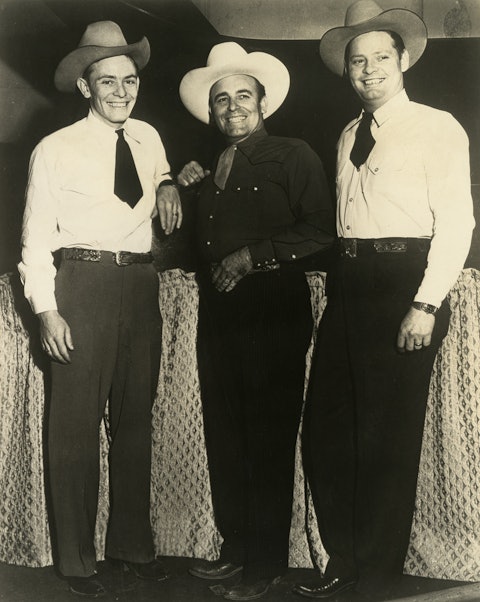
Bob Wills (center) and his brothers Billy Jack Wills (left) and Luke Wills, c. 1940s.
-
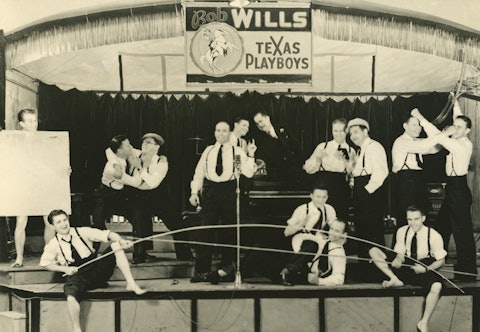
Publicity photo of Bob Wills (center) & His Texas Playboys goofing around on stage for Cam's Family Academy Radio, 1936.
-
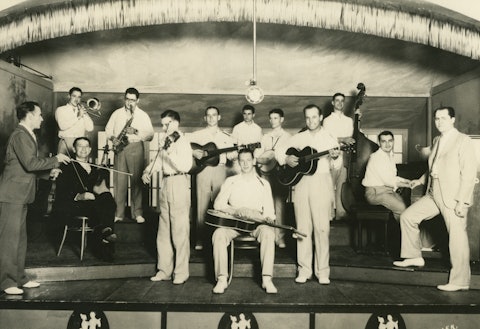
Publicity photo of Bob Wills (far left) & His Texas Playboys posing onstage with their instruments, 1934.
-
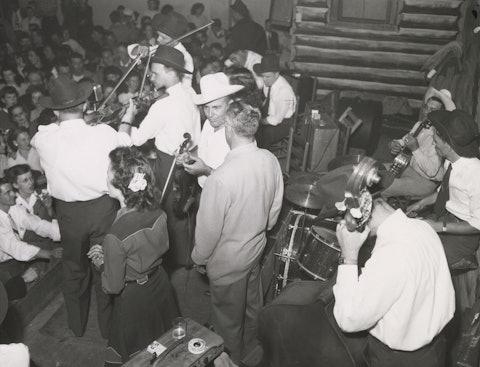
Bob Wills & His Texas Playboys onstage at Maple Hall in Milpitas, California, 1948. (Lower Right Only)
-
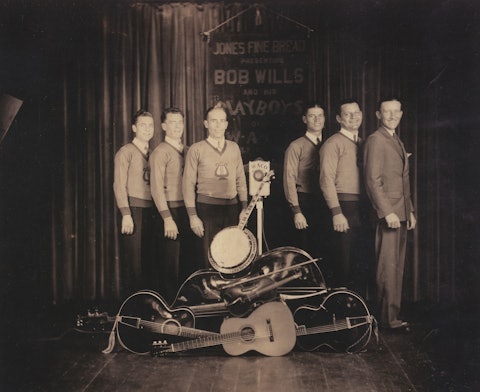
Early publicity photo of Bob Wills (third from left) & His Texas Playboys, 1933.
-
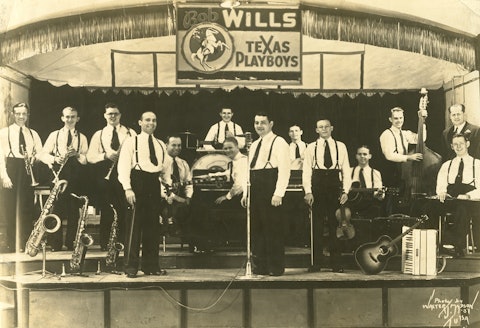
Publicity photo of Bob Wills (fourth from left) & His Texas Playboys posing onstage with their instruments, 1937. Photo by Walter T.J. Madison, Tulsa, Oklahoma.
-
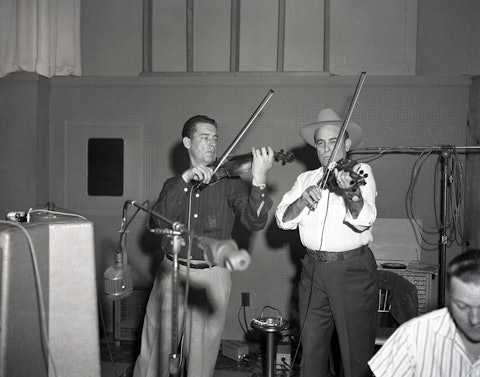
Bob Wills (right) playing fiddle at a recording session for Decca Records at Bradley Studio, in Nashville, 1956. Photo by Elmer Williams.
-
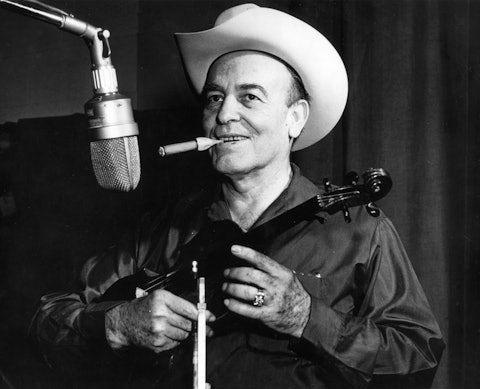
Bob Wills at a recording session, c. 1960s.
-
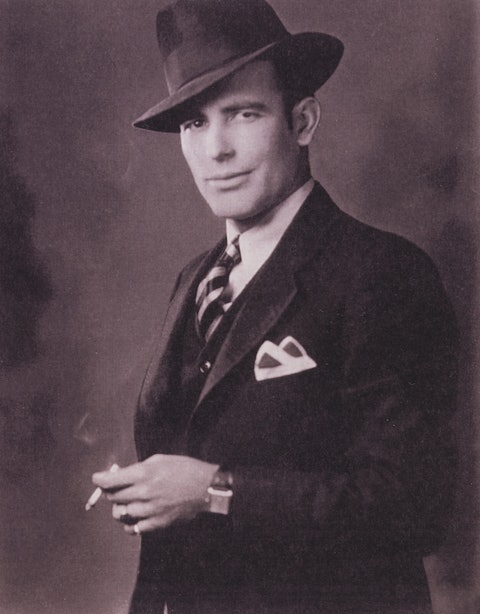
Studio portrait of Bob Wills, c. early 1940s.
-

Publicity photo of the Fort Worth Doughboys, 1932. From left: Sleepy Johnson, Bob Wills, Durwood Brown, and Milton Brown.
The King of Western Swing
Bob Wills & His Texas Playboys enjoyed their greatest success from 1935 to 1947 while recording for ARC/Vocalion/OKeh/Columbia. These recordings sold in the hundreds of thousands, and his “San Antonio Rose” probably sold in the millions. On the strength of his popularity on radio and recordings, Wills began making musical westerns in Hollywood in 1940.
Wills’s December 1942 induction into the Army broke up the Texas Playboys, but upon his discharge in 1943, he relocated to southern California and reformed the band. There, he was more financially successful than at any other time in his career. Huge crowds at his dances and strong-selling recordings made him one of the highest-paid bandleaders in America.
After the World War II, Wills decided to give up most of the brass and reed instruments in his band and rely more on fiddles, guitars, steel guitars, and mandolins. This new emphasis on strings helped him maintain a fairly strong following into the late 1940s, even after the age of the big bands was largely over. Unfortunately for Wills, however, his accomplished vocalist Tommy Duncan left the Texas Playboys in 1948 to form his own band. After leaving Columbia Records in 1947, Wills worked with a series of labels: MGM (1947-1954), Decca (1955-1957), Liberty (1960-1963), Longhorn (1964), and Kapp (1965-1969).
Later Life and Career
The late 1950s saw a resurging interest in western swing, with Wills returning to Tulsa. The band quickly expanded with the additions of a saxophone section and a new vocalist, Leon Rausch. When the band’s bookings concentrated in Las Vegas, Wills and the band moved there in late 1959. Tommy Duncan returned briefly (1960–1962). By 1967, Wills had disbanded the Texas Playboys. Although he still toured and performed, he did so with house bands and one lone employee, vocalist Gene “Tag” Lambert, who doubled as his driver.
In October 1968, Wills was elected to the Country Music Hall of Fame, but the following May he suffered a stroke that marked the end of his performing days. In December 1973, he recorded his final album, For the Last Time, released by United Artists. Other strokes followed, but Wills held on until May 13, 1975, when he died of pneumonia.
—Charles R. Townsend
Adapted from the Country Music Hall of Fame® and Museum’s Encyclopedia of Country Music, published by Oxford University Press



